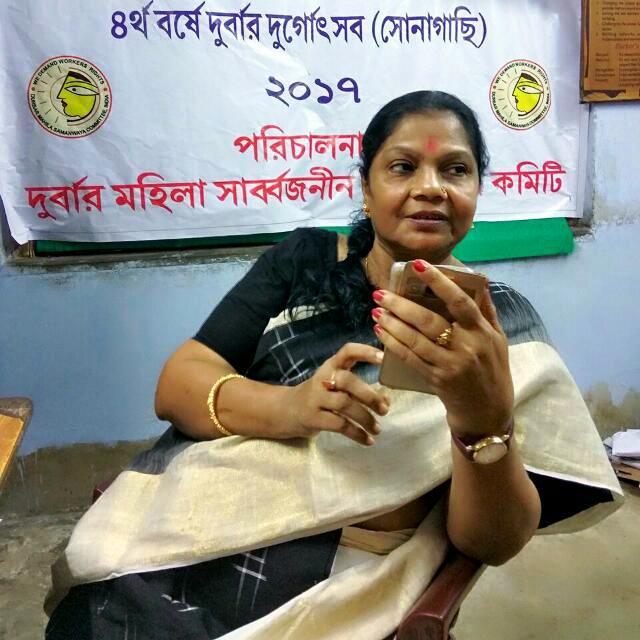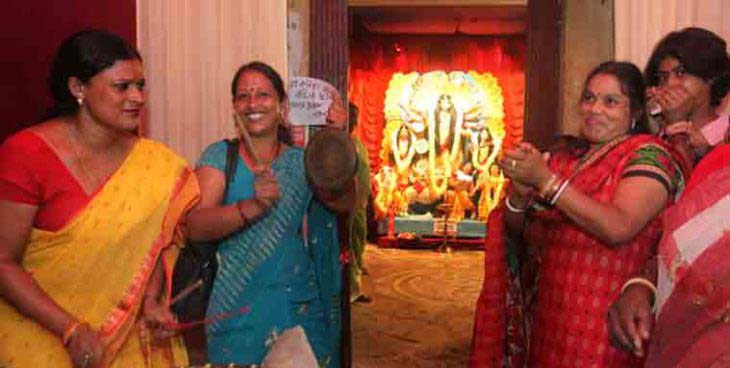There is a special relationship between the biggest red-light district of the country, the Sonagachi area of Kolkata, and Durga Puja. The relationship is special in the sense that the idol of Durga is made from the soil brought from the courtyard of sex workers. This mud is considered auspicious for conducting Durga Puja.
However, for the past few years, sex workers have been refusing to give the mud from their courtyard and instead are celebrating a Durga Puja of their own, one of the main festivals of Bengal. The reason for refusal is Durga Puja itself. Even though the mud from their courtyards is considered sacred, they are not. Thousands of rupees are collected from them as donation for the Puja but they are not allowed to even enter the pandals. They are treated as if their mere presence will pollute the pandal and make it unfit for the Puja.

OUR BODY, OUR MONEY AND OUR MUD ARE SACRED, THEN WHY AREN’T WE?
In a conversation with the FORWARD Press, Bharti De, the mentor and advisor of Sex Workers’ Association Darbar Samonoy Committee, said, “Durga’s idol is made from the clay of the sex worker’s courtyard, the event is held with their donations, but when the sex workers want to go to the Durga pandal, they are not allowed to enter. The question is that if our soil is sacred, our money is sacred, and the body consumed by so-called civilized men in the dark of the night is sacred, then why are we considered profane?”
Mainstream society has always given us the evil eye and ostracized us. Why then does this untainted society want to make the idol of Durga from the soil of our profane courtyard? As a result, all the sex workers have decided that we will not give even a pinch of soil in the name of Durga Puja. What kind of joke is that our soil and our money are sacred to these people, but we are not?”
THEY THEMSELVES ORDER ARTISTS TO MAKE DURGA’S IDOLS FROM THE SOIL OF THEIR COURTYARD
Bharti De says, “Sonagachi’s sex workers have not given soil of their courtyard for the last few years. Why should we give the soil to a society that makes the idol of Durga from the soil of our houses, charges us thousands, lakhs of rupees in the name of Durga Puja, but does not allow us to participate in that puja? Now, we pay artists to make the idol of Durga for us only and conduct our own Durga Puja. We do not need such a conniving and deceitful society, whose norms differ for every citizen and are in contravention to the right to equality enshrined in the Constitution. That is why for the last three years, sex workers have organized their own Durga Puja separately.”

Reshma Kumari, a sex worker in Sonagachi for the last 13 years, says, “We are prostitutes, society sees us with sheer disdain. Yes, it is a different matter that the gentlemen of the same civilized society come to us in the dark of the night, but are appalled by our names in broad daylight. That is why we are not allowed to enter the pandal of the Durga idol which is made from the soil of our courtyard. So, why would we donate our courtyard for the ritualistic needs of such a society that dishonours us with the terms like profane, the symbol of evil, maleficent?”
According to sex workers, some people are now selling ordinary soil as Sonagachi soil.
Sex Workers’ Association Darbar Samonay Committee has been operational since 1995. All the members of the organization are sex workers themselves. Bharti De, 48, who joined the association in 1997, has been a sex worker herself and is now fighting for the interests and welfare of these prostitutes. This non-cooperation in the holding of Durga Puja and is part of that struggle.
According to the religious beliefs, the soil brought from the courtyard of the sex workers is considered to be extremely auspicious and essential for Durga Puja, so much so that without it, the puja remains incomplete.
The artisans that make the idol also say that according to Hindu religious beliefs and centuries-old traditions, the idols are not considered complete unless the soil from the patio of these sex workers is used to make them. According to an artisan, “It is also a belief that when a person goes to such a place, all his goodness remains outside. His goodness settles in the soil outside. That is why the soil is used to make the idol.”
According to another Indian belief, the woman is considered an incarnation of goddess Shakti and anything that is wrong in her is the result of flaws in society and the times. So, to uphold the honour of women, this practice has continued. But what kind of respect is it? Their mud honors the goddess but their physical presence dishonors her and is strictly prohibited.
THE SOIL OF TEN PLACES IS IMPORTANT
Nrisingha Prasad Bhaduri, mythologist and indologist, claims that for Hindu rituals, “Dasha Mritika” (soil of ten places) is required. “It is a mixture of soil from 10 different places,” he says. “In addition to the soil from brothel, soils from the top of the mountain, both sides of a river, the horns of an ox, the ivory of an elephant, the pig’s ankles, a termite mound, entrance to a large building, a crossroads and a slaughterhouse are brought. The tradition of using clay from 10 different places actually symbolizes the inclusion of people from all sections of society and unites them in worship.”
Also read: When Asurs refused to enter a Kolkata Durga Puja pandal
Even if this is the principle on which the tradition is based, in Durga Puja, prostitutes should receive the respect and position accorded to an ordinary woman or man. The reality of brahmanical society stands exposed here. The society of those who use the soil of prostitutes’ courtyard deny them the right to enter the worship.
SIXTY-FIVE-THOUSAND-STRONG COMMITTEE
Bharti Dey adds, “The life of a prostitute is worse than hell. We have set up the Sex Workers’ Association Darbar Samonay Committee to make it somewhat better. At present, about sixty-five thousand sex workers are associated with our organization. Almost half of the sex workers though are not associated with this organization – Sonagachi has an estimated 1.35 lakhs sex workers. But after establishing the organization, we are able to fight for our rights and life is getting easier than before.”
Translation: Swayam, copy-editing: Zeeshan/Lokesh/Anil
Forward Press also publishes books on Bahujan issues. Forward Press Books sheds light on the widespread problems as well as the finer aspects of Bahujan (Dalit, OBC, Adivasi, Nomadic, Pasmanda) society, culture, literature and politics. Contact us for a list of FP Books’ titles and to order. Mobile: +917827427311, Email: info@forwardmagazine.in)
The titles from Forward Press Books are also available on Kindle and these e-books cost less than their print versions. Browse and buy:
The Case for Bahujan Literature
Dalit Panthers: An Authoritative History







